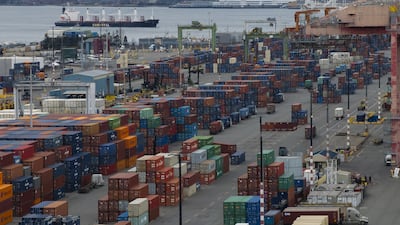Growth in China, the world's second largest economy, and in Europe is expected to be hit by the announcement of new tariffs by the Donald Trump administration, while the impact on growth in the US will be limited, according to Goldman Sachs.
This month, the US announced a 10 per cent duty on all goods imported from China into the US.
It also ordered a 25 per cent import tax on all steel and aluminium entering the US, set to take effect on March 12, while delaying tariffs on Mexico and Canada by a month.
"We would expect that growth in the US would probably slow by a quarter point or so," Joseph Briggs, who co-leads the global economics team at Goldman Sachs Research, said on Friday. "And furthermore, some of the more pro-growth parts of President Trump's agenda should provide offsets that leave the net impact on GDP (gross domestic product) somewhat neutral."
Wall Street indices were mixed at the end of the session on Friday, with the S&P 500 near flat and Nasdaq Composite up by 0.4 per cent as traders tracked tariff announcements and the US economic data, which showed inflation ticking up in the world’s largest economy.
The Dow Jones Industrial Average closed down by 0.4 per cent.
On Thursday, Mr Trump also directed commerce and economic officials to study reciprocal tariffs on nations that impose duties on American goods, with their recommendations due by April 1.
He also threatened a 100 per cent tariff on Brics countries if they decide to replace the US dollar as their reserve currency.
“We do expect bigger headwinds in China. They have been the target of most of the hawkish trade news recently. We have seen 10 percentage point tariffs already implemented … we are expecting another 10 percentage points, and under that scenario, we expect that growth this year will probably be about 70 basis points lower than it would have been otherwise,” Mr Briggs said.
China's economy is forecast to grow by 4.6 per cent in 2025, according to a recent analysis by the International Monetary Fund. The country’s economy recovered slowly following the coronavirus pandemic, with the government unveiling a series of stimulus packages in support.
Europe is also expected to be hit by US trade policies and is projected to record slower growth this year.
“If you are a German exporter and you're seeing growth slow in China and you're worried about tariffs on the EU, then you're probably not going to be scaling up hiring or undertaking large capital investments until you have clarity around the business environment that you're going to be operating in,” Mr Briggs said.
“So, during the last trade war, we saw that this type of dynamic slowed growth in the euro area probably by about a point. We expect that a similar dynamic is going to play out this time. It's the reason why, the day after Trump's election, we took down our European growth forecast by half a point, and are still forecasting a well-below-consensus pace of growth of 0.7 per cent in the euro area this year.”
In Europe, London's FTSE 100 closed 0.4 per cent lower, while Paris' CAC 40 gained 0.2 per cent. Frankfurt's DAX was down 0.4 per cent when markets closed on Friday on concerns related to economic slowdown in Europe.
The IMF forecasts the euro area to grow by 1 per cent this year in its world economic outlook in January.


